Equipment
We have a wide range of equipment for conducting chemical and physicochemical research or tests with a wide spectrum of substances in order to obtain numerous and diversified products. The significant size of plants - up to 300 liters - allows us to obtain and process substances to an extent that far exceeds the capabilities of a typical laboratory equipment. We emphasize the high chemical resistance of our reactors to the tested substances. Individual elements of the equipment are made of titanium, hastelloy, acid-resistant steel alloys (e.g. 304 or 316L) and enamel.
We are able to provide test results for:
- chemical reactions,
- crystallization,
- distillation,
- concentration,
- filtration,
- and other similar processes.
The research is conducted based on the procedure/recipe provided to us by the client. We also select the process conditions for performing experiments if the client does not have a ready documentation for the tested samples. Chemical reactions are carried out continuously or periodically, using a liquid or gas phase, depending on demand.
We offer comprehensive services in the field of catalysts production for the purpose of the conducted processes/reactions. Besides homogeneous catalysts, we are also deliver solid catalysts, in the form of extrudates or modified ion exchange catalysts, etc.
Our equipment allows us to examine:
- kinetics of homogeneous and heterogeneous reactions,
- performance characteristics, deactivation and lifetime of heterogeneous catalysts.
We carry out activities using mixers with capacities ranging from 0.5 L to 175 L for:
- mixing,
- production of suspensions,
- dissolving,
- lixiviation (extraction from a solid).
Crystallization methods:
- suspension from solutions: in a periodic or continuous manner (apparatus with a capacity of 15 L to 330 L in conditions up to 150 °C and 3 bar),
- fractional melt: in periodic or continuous manner (pipe equipment allows a flow rate of up to 60 L/h and a temperature of up to 220 °C),
- fractional melt: in a semi-technical plant for chemical syntheses in a periodic manner (temperature up to 220 °C).
Filtration:
Filtration processes are carried out in a 15-litre nutsch filter. We carry out research on the selection of filter fabric. Suspensions are filtered under vacuum conditions.
Periodic filtration can be also performed in a drum filter with a feed flow of up to 30L/h. It enables us to process with nitrogen overpressure as well as filter cake washing.
Granulation:
Granulation processes are carried out on a granulation belt with the capacity of up to 15 dm³/h.
Distillation and rectification
We offer distillation and rectification services. Processes are conducted in a continuous, semi-continuous and periodic manner. We perform activities in various conditions, from normal pressure to vacuum. High heating efficiency and a wide range of flask/evaporator capacities from 2 to even 175 L allow us for quick and efficient distillation and rectification. We use various column packings for the process: Raschig rings, Pall rings and other structural packings.
Our offer includes continuous distillation using a semi-technical installation for chemical synthesis and the use of thin-film evaporators with a falling liquid film.
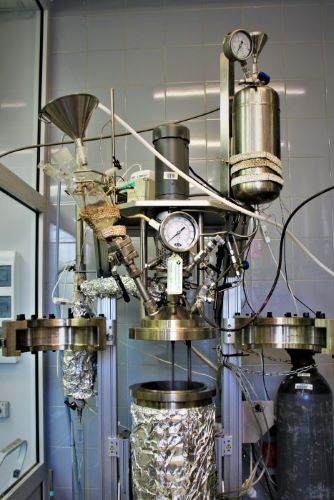
15 liter pressure reactor
The reactor is made of titanium alloy (Grade 7). It can reach the maximum pressure of 80 bar and the temperature of 300 °C. The reactor is equipped with a durable magnetic drive in which a magnetic attachment is connected to a mechanical stirrer.
Depending on the task, an anchor or turbine mixer can be connected. The equipment also includes a bottom discharge, a reflux condenser, a condensate receiver and a gas and liquid supply, gas removal.
High-temperature gel chromatograph EcoSEC HT-GPC by TOSOH
This modern device enables testing of the molecular weight distribution of polymers and resins.The chromatograph can determine the molecular weight distribution, as well as polydispersion (molecule mass distribution). The EcoSEC HT-GPC has a refractometric detector and is able to operate in the temperature range from 20 °C to 200 °C.The apparatus is equipped with polystyrene-packed column, which allows for the determination of molar mass in the range of 500-99,200 Da. In addition, the chromatograph can be equipped with columns with various packings.Thanks to this, we can carry out tests in various ranges of molecular weights and using a wider range of solvents - depending on the requirements related to the analyzed samples.
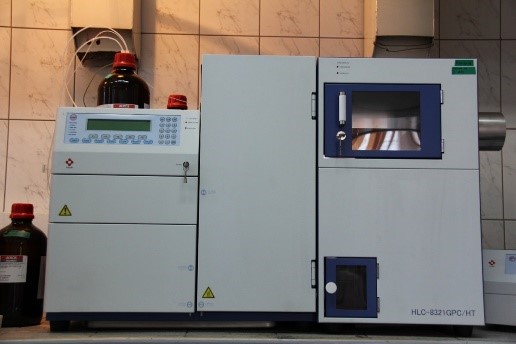
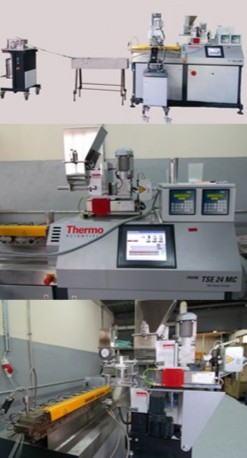
Twin screw extruder
Thanks to the twin screw extruder, we can research and develop thermoplastics. A low scale processing line allows us to obtain materials with a constant and strictly controlled composition.
The efficiency of our extruder reaches up to 12 kg/h. From the manufactured batches of plastics, at the customer's request, we will provide quality confirmation developed according to jointly adopted criteria and analytical methods.
Solids analyzers
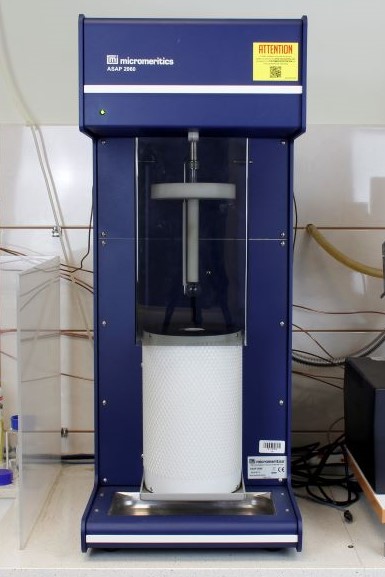
Micromeritics ASAP 2060 specific surface area analyzer
The specific surface area (BET) and micro- and mesopores distribution analyzer enables the analysis of solid materials with a large surface (porosimetry). Thanks to this, we can determine the specific surface area, pore volume, and pore size distribution.It is also used to determine adsorption isotherms using appropriate computational algorithms.
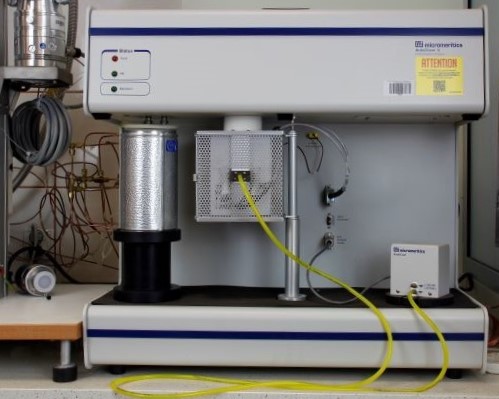
Micromeritics AutoChem II 2920 chemisorption analyzer
We can use it to perform operations such as pulsed chemisorption or temperature-programmed oxidation (TPO), reduction (TPR) and desorption (TPD). It allows us to test catalysts in all temperature-programmed catalytic techniques involving gases and vapors.
Pressure equipment
Pressure reactors dedicated to ethoxylation processes/ oxypropylene installations
Pressure processes such as:
- synthesis of non-ionic surfactants,
- synthesis of polyurethane polyols,
- use of new raw material types,
- tests of new catalysts,
are carried out using universal high-pressure reactors with a volume of 500 to 2000 mL, designed for periodic operation. They are used for processing ethylene oxide and propylene oxide and are controlled automatically.
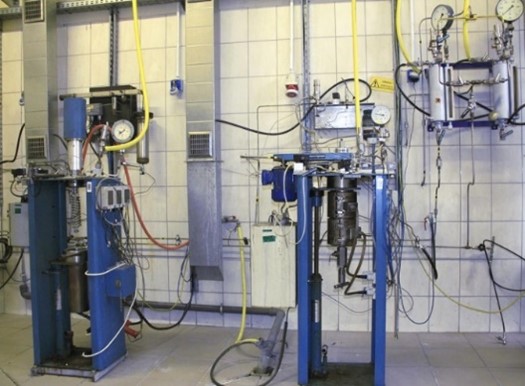
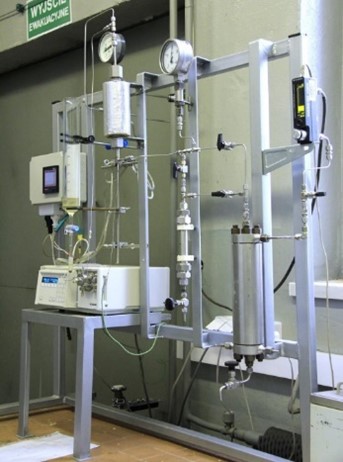
Hydrogen processes equipment
We have a fully automated high-pressure reactor designed to work with a catalyst in a stationary bed. The 20 cm³ tank can operate at temperatures up to 500 °C, reaching a working pressure of up to 100 bar.
We perform screening tests in the reactor and perform initial continuous processes.
EVO-300 reactor
Long-term catalytic tests, simulations and optimizations of various hydrogen processes are performed using a high-pressure, gradient-free bubble reactor.
The working capacity of the tank is 700 cm³. The reactor can reach the temperature of up to 400 °C and an operating pressure of up to 300 bar.
The EVO-300 reaction set is a unique system for conducting long-term catalytic tests. The universal nature of the reactor allows for simulation and optimization of various chemical processes. The reactor has a flow system with an additional pump, which allows to continuously recycle the raw material.
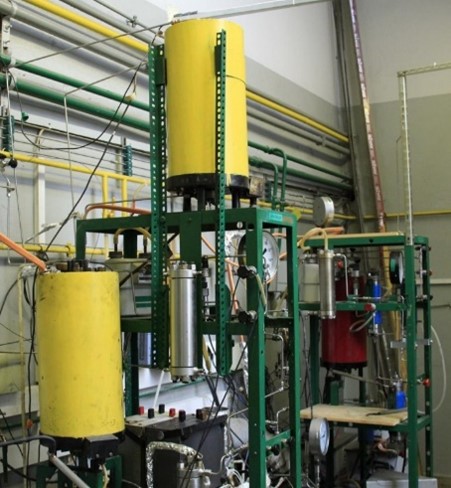
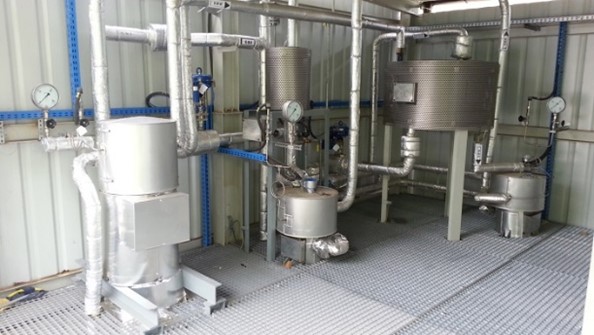
Quarter-technical hydrogenation plant
For continuous operations we use a universal high-pressure plant. We conduct processes using catalysts intended for operation in a fixed bed or in the form of a suspension.
The plant allows to:
- collect data to prepare complete mass balances,
- test the activity and selectivity of catalysts,
- determine the lifetime of the catalyst,
- optimize process parameters,
- scale technological processes.
Plant parameters:
- reactor volume: 17 dm³,
- operating temperature: up to 350 °C,
- working pressure: up to 200 bar,
hydrogen recirculation system.
Quater-technical equipment for chemical syntheses
Large-scale processes are conducted on quater-technical equipment for chemical syntheses. Thanks to it, we can model the activities performed on industrial plants. The universal nature of the plant allows for continuous operation using heterogeneous catalysts.
The plant is very versatile - it consists of units that can be used independently of each other. Most of the elements are made of acid-resistant steel (AISI 316L), and the whole can be heated to a temperature of 170 °C.
The equipment consists of over 80 devices:
- baths for melting raw materials in barrels up to 0.2 m³, filled with glycol with a permissible temperature of 100 °C;
- 14 operating tanks with capacities from 0.1 to 0.5 m³;
- 14 metering pumps (flow 0.5-80 dm³/h) with smooth speed regulation using an inverter;
- 3 flow reactors connected in series with a total capacity of 2.9 dm³ each (working capacity 1.9 dm³);
- 3 coolers for thermostatting the reaction mixture;
- 2 static mixers;
- crystallizer (capacity 0.33 m³) equipped with a high-speed mixer and coil with the possibility of heating and cooling;
- pressure filter for separating the crystal suspension from the solvent (max. flow rate 30 dm³/h);
- a tank with a stirrer with the possibility of melting crystals from a pressure filter (0.1 m³, temperature 120 °C);
- crystallizer (capacity 9.8 dm³) equipped with a coil fed with thermostated oil and an oil-heated shell;
- one thin-film evaporator with a falling liquid film (flow rate max. 30 dm³/h), with oil heating from a heating and cooling thermostat;
- two thin-film evaporators with falling liquid film (flow rate max. 15 dm³/h with oil heating from a heating and cooling thermostat;
- granulation belt (flow rate max. 15 dm³/h);
- vacuum pump (flow max. 100 m³/h);
- vacuum pump (flow max. 30 m³/h);
- water heater;
- nitrogen heater;
- 5 high-efficiency oil heating and cooling thermostats;
- barometric closure for inerting the installation;
- gas absorber.
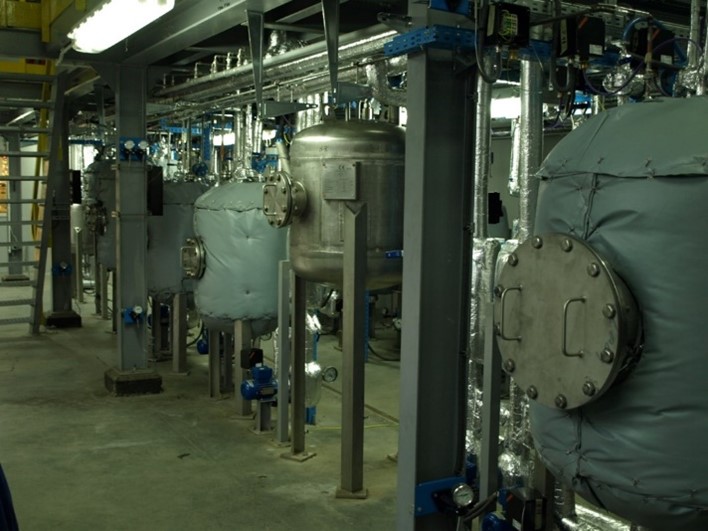

 Polski
Polski












